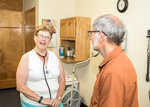
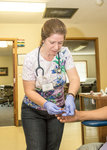
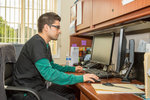
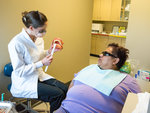
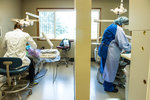
BATTLE GROUND – Battle Ground HealthCare (BGHC) celebrated their fifth anniversary on June 9 with a satisfied nod for all they have accomplished, and ambitious ideas for how they will move forward.
The clinic provides medical care for adults with chronic conditions such as diabetes, heart disease, obesity and chronic pain, as well as basic dental care. And it’s all at no charge.
Perhaps surprisingly, one of the greatest challenges for the clinic is reaching people who are eligible for their services. When the clinic first opened, most patients earned below 138 percent of the federal poverty level income. With the advent of the Affordable Care Act, this began to look different. Now those lowest income patients have insurance and can access traditional health care.
But, there is now a segment of people who have a higher income but their health insurance has very high deductibles. Even though they have health insurance, they can’t afford to use it. These are the patients who BGHC is trying to reach out to. They want to serve those who may have health care but have barriers to using it.
BGHC serves people who earn up to 300 percent of the federal poverty level income. This is higher than most people think, said Sue Neal, executive director of BGHC. It equates to $35,310 for an individual, or $72,750 for a family of four.
“We are really trying to reach them to let them know they can come see us,” she said.
According to Neal, the clinic is based on a belief that the mind, the body and the spirit are all very important in a person’s total health. The clinic’s mission is faith-based, but the services are free of “evangelizing,” she said. But, she said, “If a person’s spiritual life is important to their care, we want to be able to meet that need.”
Many patients are facing multiple ordeals in their lives, along with health conditions.
“We want them to feel they are receiving care and support for their health care challenges,” Neal said. “Then they can deal with other challenges better.”
All new patients at BGHC go through a screening assessment first. Dental screenings are on the first Tuesday of each month, by appointment. Medical screenings are done over the phone, and if the patient’s medical condition qualifies for care they are scheduled for an appointment. Patients with acute conditions or complicated dental needs are offered referrals to other providers.
BGHC relies on volunteers for every aspect of their organization. There are currently about 120 volunteers active during the course of a year; some come in weekly, and others help with special events.
Many people who come in for care ask how they can give back and become volunteers, said Neal.
“Volunteers are the heart and soul of the organization,” she said.
Melissa is one volunteer who has done a bit of about everything. She got involved with the medical clinic when it first opened, and volunteered her nursing skills. She was asked to come over to the dental clinic to help out with the computers, and then asked if she could do some data entry. Pretty soon, she was recruited to help with the reception desk and scheduling.
“I wasn’t used to meeting and greeting patients, but I love it,” she said.
And she sees the difference the clinic makes to the patients. She recalls one older woman who had moved to the area to live with her grown children, and suffered from many medical issues. Melissa heard her exclaim joyfully as she ended their phone call, “They’re going to see me!”
“It made me realize how much this means to people,” she said.
On the day this reporter visited, Robert Allen of La Center was waiting for his dental appointment. Allen became disabled in a workplace accident four years ago, and hadn’t been able to afford insurance since then. He said he had always provided for his wife and four children; he didn’t expect to be using a free clinic.
When his wife needed dental work that they couldn’t afford to pay for, he was embarrassed to accompany her to the clinic.
“I had my heels dug in,” Allen said. But, he said, everyone made them feel comfortable. He found he was able to accept the assistance without obligation or shame.
“It’s been a blessing,” Allen said. “I’ve always been a proud man. Or I should say I used to be a proud man. If I don’t accept (help) my family suffers. Blessings appear in ways you don’t expect it.”
Two years later, the whole family has received dental care at the clinic. Allen is also impressed with the quality of care they receive.
“They call and check up on me between appointments,” he said. “I never got that when I was paying for it.”
Now Allen thinks that injury might have been a blessing.
“It’s taught me humility … to learn to accept and learn to give,” he said. “I had closed myself and my family off to opportunities to need people and be part of people’s lives.”
This is the kind of care that Neal aims for all clinic patients to receive.
“We make it welcoming like any other clinic,” she said. “Patients have access to all the same best standards of care that you would have in any clinic.”
Doctors spend up to an hour with each patient, in order to understand their history and what’s going on with them right now, she said. Patients have the opportunity to meet with a nurse educator to learn about what their diagnosis means, and have access to a dietician to learn to prepare healthy meals that work with their diagnosis.
The clinic also helps each patient access the medication they need at free or reduced prices.
“It doesn’t do any good to have care if you can’t afford your meds,” Neal said.
Dr. Steven Hokett is one of the dentists who provides care at Battle Ground HealthCare. He has a full-time private practice but volunteers at BGHC once per month, along with his dental assistant Sylvia Albarran.
Hokett has been part of the dental clinic since it was just an idea thrown around at a church potluck.
“This was just a dream for a long time and all of a sudden it came to fruition,” Hokett said.
The pieces came together from across the community. Dental chairs, equipment, storage cabinets – all were donated. Monetary donations helped to fill in the gaps.
The clinic offers general dentistry such as small fillings and extractions. If clients need oral surgery or dentures, they are referred to other service providers.
The first step to receiving dental care is an appointment with the screening clinic, to gather the patient’s history and take X-rays. Based upon the findings, new clients are schedule for treatment or referred to a clinic that can meet their needs.
It can be a stressful job, Hokett said. By the time patients get to the clinic they are usually in pain from their diseased tooth, and their anxiety is often extremely high. The clinic doesn’t utilize nitrous gas or pills for sedation, but uses “iatrosedation,” an atmosphere and style of interaction between the doctor and patient that is calming.
Similarly, the clinic does not prescribe narcotic pain relievers, but recommends a combination of Motrin and Tylenol, which can be equally effective without side effects.
Dental care is complementary to the care patients receive for chronic health conditions in the medical clinic. For example, diabetic patients are more prone to periodontal disease, and dental infections can lead to heart disease.
Amy White has volunteered as a dental hygienist at the clinic for the past year.
“It’s really awesome what’s going on here because many people can’t afford dental care,” White said. By the time she sees a patient, it might have been many years since they have received dental care.
The focus is always foremost on helping the patient feel comfortable.
“They’re in control,” White said. “If it’s too uncomfortable we work elsewhere.”
White sees the most important part of her job as education.
“What they (patients) do at home makes a bigger difference,” she said. Many don’t know how important flossing is. “That alone can keep us from getting cavities and gum disease.”
Nine dentists, four medical doctors and dozens of dental assistants, hygienists, nurses, receptionists, schedulers, medical records and IT specialists volunteer at the clinic. It takes 15 volunteers to run one day’s medical clinic, and seven to staff a dental clinic. More volunteers are always needed, with all types of skills.
Many community partners make it possible to connect patients with a wide range of services. Legacy Salmon Creek provides blood testing and imaging, and Vancouver Radiology reads and faxes the results to the clinic. Volunteer nurses come in between clinic days to convey results to patients.
Adventist Hospital donates all the computers and phone systems as they upgrade their own, and maintains it all as well. In addition, Kaiser Permanente has provided grant funding to support the clinic.
It’s a collaboration all around. BGHC takes some of the burden off of these services by serving patients who would otherwise utilize expensive emergency rooms for care.
Last year alone, the dental clinic performed 763 procedures for more than 400 patients, care worth an estimated $80,000. The medical clinic served another 662 patients. Volunteers contributed 6,200 hours, worth more than $500,000.
James Jutras, of Yacolt, was relieved to discover BGHC when he could no longer access insurance through his wife’s policy, since they are not legally married. He suffers from heart disease and had experienced two heart attacks over the past 15 years; he knew he needed to keep tabs on his heart health.
Jutras enrolled in the six-week program, Take Back Your Life, which incorporates nutrition, exercise and coping skills. He and his wife attended the nutrition class together and made changes in their diet and exercise. Over the next three months, he lost 30 pounds, said Jutras. He was even able to get the dentures he needed through the dental clinic.
“I loved all of it,” he said. “There was not one bit of it I didn’t like. They even gave me a $10 Fred Meyer card when I needed gas.”
“You can’t meet the quality of care you get when you go there,” Jutras said.
BGHC is not just resting on their past accomplishments, they are visioning how they can make it even better. They have received a new grant from Kaiser Permanente to offer rehabilitation services, and they are looking for occupational and physical therapists and massage therapists who would like to volunteer.
They are hoping to offer some referrals for vision care and behavioral health care as well.
“I would like our impact to be much greater than it is,” Neal said.
If you ask the patients, the impact is already pretty great.
“It’s hard to put in words what it really means to a husband and father when you are used to providing for your family,” Allen said. “There is no shame in it. I feel embarrassed that there ever was shame.”